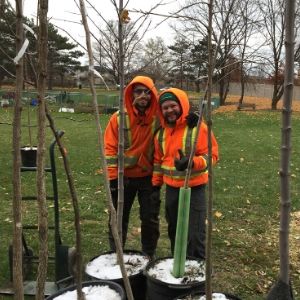
Trees provide a wide range of benefits, such as shade, improved air and water quality and better mental well-being! Unfortunately, trees and, by extension, their benefits are not equitably distributed across a city. Research has found that high-income neighbourhoods tend to have more canopy cover because they have larger and more plentiful trees, while the reverse is true for low-income neighbourhoods. Toronto is no exception as trees are more likely to be concentrated in wealthier neighbourhoods.
Without abundant tree cover, not only do low-income communities miss out on the benefits that trees provide, but they are less resilient against environmental changes and are exposed to negative environmental conditions, such as increased UV and heat exposure. In Toronto, this problem was exacerbated following the 2013 ice storm and emerald ash borer infestation. Affected communities were left with fewer trees as impacted trees were removed. 
Driven by the opportunity to plant trees in areas that would most benefit from it, a pilot project was initiated in 2018 between LEAF, TCHC and Park People, and supported by funds from Every Tree Counts, a partnership between Toronto Parks and Trees Foundation and the City of Toronto. Three TCHC sites in Etobicoke were chosen based on available planting space and community interest. Through a tree inventory, it was revealed that the average canopy cover across the three properties was around 21%, compared to the City’s average of 26-28%. In addition, only a handful of species, such as Norway maple, Austrian pine, honey locust and Siberian elm, dominated the sites, putting these communities at risk in the future.

The good news is that, with the help of Cohen & Master and City of Toronto Forestry, 75 trees, selected from 12 species, were planted last year across the three sites! LEAF and Park People were also able to engage with each community to establish a Tree Care Team at each site. These teams have provided mulching and weekly watering between May and September of 2019 to the newly planted trees. This invaluable tree care connects the community members to the new trees while providing the trees with the care they need to establish in their new locations.
Adding to the great work started last year, the initiative continues in 2019. Seventy-five trees will be planted across eight east Toronto and Scarborough TCHC properties, providing even more communities with the opportunity to benefit from the project. Work is also underway to establish and support Tree Care Teams for the 2019 plantings.
While the trees are young now, they will provide a wide range of benefits for decades to come as they mature! Through the amazing work that has been achieved, and continues to be done, this project is paving the way for equitable tree planting that puts trees in the communities that would benefit from them the most!
Lam Tran is the Education Coordinator at LEAF. She holds a Master’s of Forest Conservation from the University of Toronto.
The 2018 Toronto Community Housing Corporation Planting and Stewardship Initiative was supported by funds from Every Tree Counts, a partnership between Toronto Parks and Trees Foundation and the City of Toronto. Additional support in the form of trees and planting services was provided by City of Toronto Forestry. Cohen & Master Tree and Shrub Services also provided in-kind support to the project.
The 2019 project is supported by funds from Every Tree Counts, a partnership between Toronto Parks and Trees Foundation and the City of Toronto. It is also supported by funds from TD Green Space Grant from TD Bank Group (TD) and the Arbor Day Foundation, which support innovative urban greening and tree planting projects in underserved areas of the community. Support in the form of trees and planting services is provided by City of Toronto Forestry.
